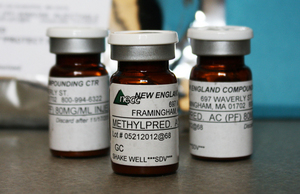Meningitis update: Five new Michigan cases identified, including three at St. Joseph Mercy hospital
Federal officials confirmed five new cases of fungal meningitis in Michigan Monday afternoon,bringing the total number of patients associated with the outbreak in the state to 46, including three deaths.
Three of the newly-identified cases were reported from St. Joseph Mercy Ann Arbor, hospital spokeswoman Lauren Smoker said Monday. As of Monday, 36 fungal meningitis patients are currently hospitalized at the facility.
Patients who have had symptoms of fungal meningitis at any St. Joseph Mercy Health System facilities were referred to the Ann Arbor location for treatment, hospital officials have said.

Vials of a steroid manufactured by the New England Compounding Center in Massachusetts that have been recalled in connection with an outbreak of fungal meningitis.
The Associated Press
Smoker said no further information could be released about the two patients who were discharged.
A patient is still undergoing treatment at the University of Michigan Health System, officials said Monday. UMHS reported the other of its two fungal meningitis patients died last week. Family members identified that patient as Lillian Cary, 67, of Howell.
The Centers for Disease Control and Prevention is closely working with state health departments and hospitals to identify cases of fungal meningitis linked to contaminated steroids manufactured at the New England Compounding Center in Massachusetts.
Four Michigan facilities received shipments of the steroid, which is administered as an injection for joint and back pain.
Attorneys for Brenda Bansale, 46, of Howell, a patient hospitalized at St. Joseph Mercy with fungal meningitis, filed suit against the Massachusetts company that manufactured the recalled steroid linked to the outbreak, the Livingston Daily Press and Argus reported Monday.
Over the weekend, the number of confirmed cases of fungal meningitis surpassed the 200-mark. As of Monday afternoon, 214 cases - including 15 deaths - in 14 states had been identified, according to the CDC. About 14,000 people in 23 states could be at risk for fungal meningitis, according to the CDC.
While federal officials are considering stricter regulations on the compounding pharmaceutical industry, administrators at the University of Michigan Health System are reviewing their policy for where they get some of their drugs when supplies run short, Michigan Radio reported recently.
Amy Biolchini covers Washtenaw County, health and environmental issues for AnnArbor.com. Reach her at (734) 623-2552, amybiolchini@annarbor.com or on Twitter.


Comments
talker
Tue, Oct 16, 2012 : 6:09 p.m.
My guess is that all of NECC's insurance and the value of all the (likely defunct) company's assets, such as real estate, won't be as much as victims' families and their lawyers sue for. This is a tragedy. I disagree that the ages or health conditions of patients caused the problems. Patients of all ages and with all conditions who agree to certain procedures and understand risks, aren't expecting to be treated with tainted compounds.
BhavanaJagat
Tue, Oct 16, 2012 : 3:48 p.m.
Medical Therapeutics : Therapeutics is the branch of Medicine that deals with the treatment and cure of diseases. I can understand the problem of contamination at the Pharmacy where the injectable solutions are prepared. These injectable preparations were sent to various treatment facilities across the nation before the receipt of valid, individual prescriptions to provide therapeutic intervention for known individual patients. The problem is not simply the act of the Pharmacy. The physicians may have failed to use the sense of discretion. The physician is not expected to administer a therapeutic agent that was not prepared in compliance with a written prescription for the same. The second act of indiscretion involves the therapeutic guidelines used in the therapy. Many of these deaths are reported among the elderly patients. Age of the patient is of very high significance in the choice of a therapeutic intervention. This part of the story will be revealed as the investigation of this problem continues.
15crown00
Sun, Oct 21, 2012 : 12:37 p.m.
stop rationalizing.the outfit that supplied the drug screwed up and u know iTtEND OF CONVERSATION!!!!
sHa
Tue, Oct 16, 2012 : 11:18 p.m.
The physicians' sense of discretion had absolutely nothing to do with the fact that the compounds were tainted. Therapeutic guidelines have absolutely nothing to do with the fact that the steroids were tainted. The age of the patients has absolutely nothing to do with the fact that the steroids were tainted. Actually, the problem is, in fact, the act of the Pharmacy that provided the contaminated steroids
eagleman
Mon, Oct 15, 2012 : 11:37 p.m.
My father is one of those who is infected. Needless to say we are deeply concerned about this. Such gross incompetence ought to be penalized civilly and criminally.
sHa
Mon, Oct 15, 2012 : 11:55 p.m.
What is less frequently mentioned in this recent outbreak is that the drugs used to treat fungal meningitis can cause serious side effects like liver and kidney damage and must be monitored meticulously by physicians. My husband recovered from fungal meningitis several years ago, his being cryptococcal meningitis. The anti-fungal drugs caused permanent kidney damage; however, we are thankful he is alive.